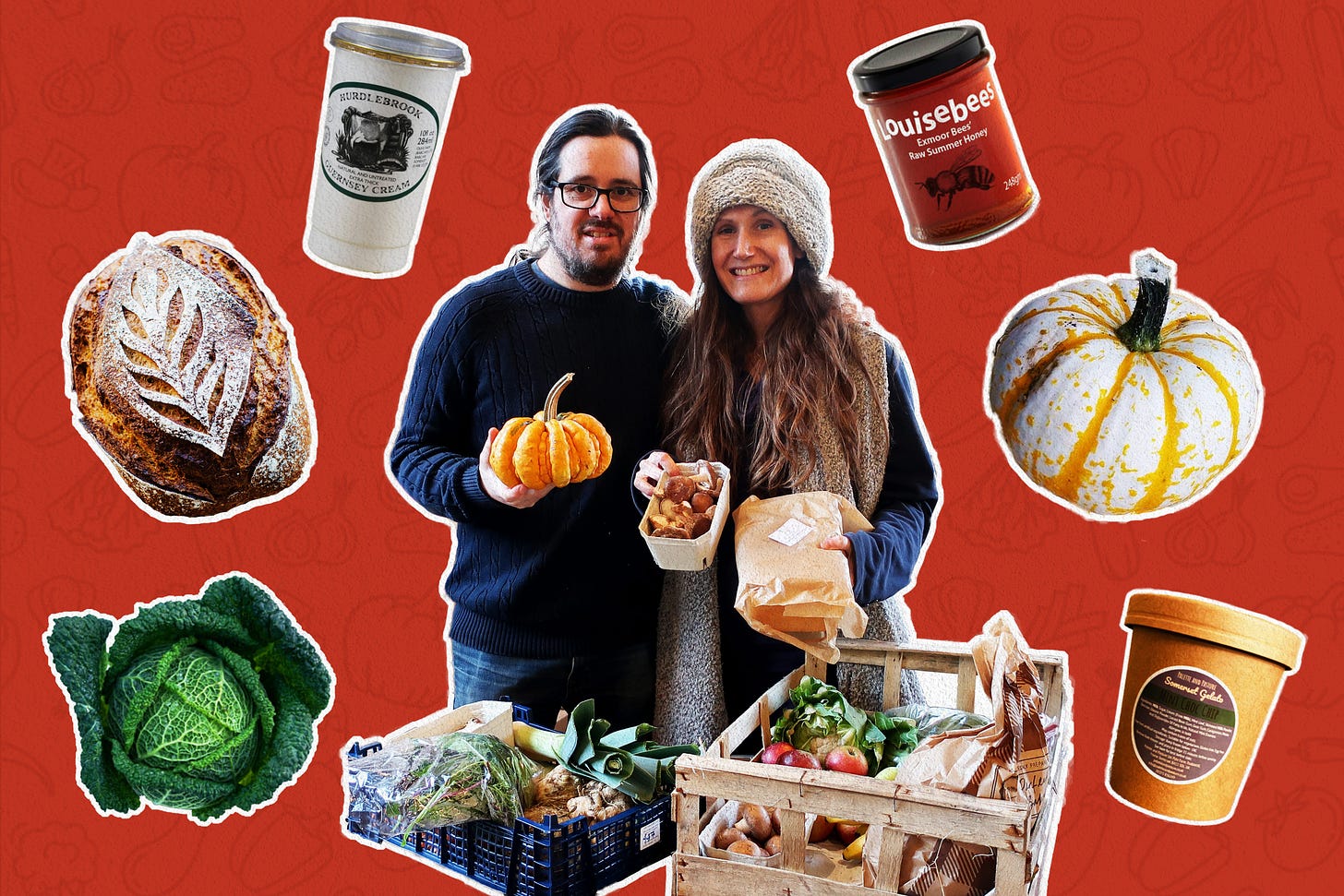Less distance = more difference? [WFJ #1]
Food hubs could be the answer to supplying towns like Frome with hyper-local produce
8 pence. For every pound we spend at the supermarket, that’s the cut farmers typically get. A bombshell not only in itself, but one that sums up why conventional food systems are so out of whack.
Need it be said, someone receiving decreasing returns for what they make is – not necessarily through any fault of their own – going to find cheaper ways to produce those goods.
In the context of making your food, that might mean farmers opting for large herds of bigger, faster-growing cattle breeds (regardless of whether there’s enough space and natural forage for them), cultivating large swathes of the same crop (neglecting biodiversity in the process), or using agrochemicals like pesticide and synthetic fertiliser to grow food more ‘efficiently’ (but at the expense of soil health, farmers’ health, and eaters’ health).
For too long, supermarkets have had too much control of the sale of food. Their unhindered ability to buy large amounts of food cheaply pressures those making it – according to a recent study, 95% of British farmers fulfilling contracts with supermarkets, processors, and manufacturers would rather they didn’t supply these sectors. With producers generally wanting to switch to other forms of retail, the study found that the majority of farmers surveyed think local food hubs are the way forward.
Essentially online farmers’ markets, food hubs allow producers to set their own prices without having to become experts in admin, marketing, and logistics. Food hubs’ tenets are often to do with locality, fair trade, and sustainability, and are usually set up by people wanting to have better access to the food grown in their area. Food miles, as a result, are kept to a minimum.1
Some examples are showing how food hubs can bridge a much-needed gap in their respective areas. Tamar Grow Local, which supports Plymouth, and Locavore in Glasgow are among the most successful projects in the UK helping locals access food from smaller producers.
A solution. But for who?
Formerly within the Food Assembly network, the food hub in Frome has run in its current guise since 2018.2 Its latest hosts, Ian Marshall and Kerry-Ann Peachey, took over in November last year. The main idea, Ian says, is to keep it as convenient for customers as the 40 producers that supply them.
‘Instead of delivering individually to lots of households, people order from us, we collate all those items and distribute them. It makes it a time-saving measure for consumers who are also supporting local businesses and cutting down on unnecessary transportation.’
Like most hubs, ‘local’ is another priority for the Frome Food Hub – suppliers such as Little Jack Horners, Palette and Pasture, and Vallis Veg being 5 miles, 4 miles, and 2 miles from the town centre respectively. Some others, like The Old Bakehouse, Louise Bees, and Hej Gro, operate out of the town itself. ‘With the twin demons of Covid and Brexit on top of us,’ Ian says, ‘it's vitally important that we support our local supply chains. Because without them, we may find ourselves going hungry.’
Ian realises they’re rarely able to compete with supermarkets on price. ‘However, we do have affordable items – Vallis Veg offer a £15 bag which I think is great for organic, seasonal produce.’ The hub also stocks things you can’t get anywhere else in Frome town centre, like Palette and Pasture’s gelato, Hurdlebrook’s cream, and, since they’re often over-subscribed, Vallis Veg bundles.
September House Smallholding in Horningsham is another one exclusive to the food hub. Bruce Martin and family started farming as they found it was the best way to access meat from animals that had had a good life. ‘It's all purely outdoor. They're all free-range, getting what they can from the ground. Which is why the taste is so good,’ says Bruce.
Bruce’s farm is not the sort of size (4-6 pigs, 30-35 chickens, and up to 15 sheep at any one time) where supplying large retailers was ever a question. Using a food hub means not having to worry about delivery and ecommerce through their own channels, while the fairer price for their efforts certainly helps too – for every pound spent at the Frome Food Hub, the producer takes home 80p. ‘It's been a well worthwhile exercise for us,’ Bruce says.
What could be
Through donations, Frome Food Hub distributes locally-grown fruit and veg to Fair Frome’s food bank. But its potential in working with other communities as yet remains untapped. In other towns, food hubs might supply local restaurants, schools, care homes, and hospitals. They may even help stock other forms of food retail, therefore being collaborative with businesses offering a similar service – not, as it could be perceived, simply nicking their customers.
With later opening hours and less time required for each shopping trip, food hubs can provide a better alternative for local residents with less time on their hands. It’s partly why food hubs complement a town’s food infrastructure – commonly not as convenient as physical shops or farmers’ markets, they are unlikely to replace them.
Lower food miles does not necessarily translate to lower carbon emissions. But it does correspond to other positive factors, such as seasonality and building relationships between local eaters and producers
The Frome branch of the Food Assembly opened its doors for the first time in December 2014. Four years later, in what was probably a Brexit-related move, the French-based Food Assembly decided to make its operations exclusively continental. Frome’s outpost lives on independently and under the ‘food hub’ moniker.




